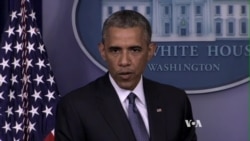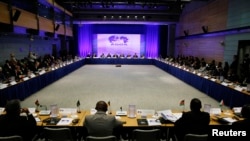U.S. President Barack Obama this week hosts the largest-ever summit of African leaders in Washington to talk about boosting U.S. engagement with the continent. The U.S. leader hopes to foster capacity building, investment in infrastructure, food security, and increasing trade with a region long neglected by U.S. administrations.
With six of the world's ten fastest-growing economies in Africa, President Obama believes it's time to change the way Americans think of the continent.
He says Africa is ripe for U.S. investment.
“We’ve made enormous progress over the last several years in not just providing traditional aid to Africa, helping countries that are suffering from malnutrition or helping countries that are suffering from AIDS, but rather partnering and thinking about how can we trade more and how can we do business together," said President Obama.
But on a Washington street, demonstrators protesting U.S. engagement with Ethiopia's leader are a reminder of the risks of attracting investment to countries ruled by corrupt and repressive governments.
In channeling aid and investment, Africa Analyst Jennifer Cooke says the U.S. has to be careful not to abet the type of behavior it is trying to stamp out.
“That is an enduring challenge and the U.S. has to take measures that the assistance it does give - whether it’s in health or education or security - are not diverted and used to prop up political regimes. It’s tricky to do, particularly in countries where the U.S. has security interests," said Cooke.
The summit focuses on trade, development, and peacekeeping - but there are no sessions specifically on rule of law and human rights issues.
Analysts say inviting African leaders and then lecturing them would be bad form.
President Obama has addressed what he sees as the need for cultural changes in Africa. He told young Africans ahead of the summit they should respect traditions, but they don't have to accept some of the old ways of doing things.
“Now, I have to say there are some traditions that just have to be gotten rid of and there’s no excuse for them. Female genital mutilation - I’m sorry, I don’t consider that a tradition worth hanging on to. I think that’s a tradition that is barbaric and should be eliminated," said Obama.
Among the sensitive issues is President Obama's condemnation of anti-gay measures in countries like Uganda - a strategically important U.S. partner. Relations with Uganda are suffering as a result of U.S. opposition to a tough law - now annulled - that would have imposed life sentences on some homosexual acts.
Obama is having to find ways to convey his message without endangering partnerships, says Jennifer Cooke.
“The U.S. government does need to be careful in how it engages on those issues - particularly the LGBT issue - lest it kind of deepen or feed into the narrative that African leaders and others may play that this is a Western-imposed agenda," she said.
Moving beyond that perception is one of Obama's goals in Africa as his administration seeks to engage the fast-growing continent .






